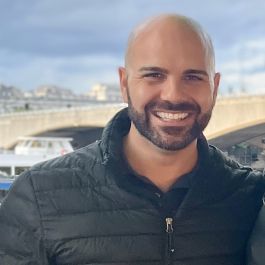Space movies can be an unlikely source of inspiration for leaders as they create mission-driven teams, offering compelling stories about what can be achieved when a group of individuals works toward a common goal.
Perhaps even more galvanizing are the genre’s cautionary tales of what happens when a team loses sight of its mission. Unforeseen events create gaps between what was originally strived for and the odds a team can accomplish its mission, and minor errors and miscommunications lead to catastrophic consequences.
What does it look like to shoot for the stars but miss the mark? Well, in the uncharted reaches of space, there are exacerbated, irreversible consequences: instant death in a vacuum, descent into madness, and waking from cryosleep early to find Chris Pratt is the only company you’ll have for the rest of your life, to name a few.
Fortunately, when a team loses sight of its long-term mission here on Earth, the fallout is not nearly as dramatic. But that doesn’t mean reaffirming broader goals should be deprioritized. According to leaders at three local companies, when leadership and teams are aligned, employees are more engaged, energized and purposeful.
Iterative Health has grown rapidly in the past year, an expansionary period that has reinforced the need to stay connected. VP of Data Operations Sloane Allebes Phillips understands the importance of facilitating discussions with new employees about how they fit into the bigger picture. “Our company mission is audacious, and in order to achieve it, we need to have alignment across the organization about why we do what we do,” Phillips said.
Hilary Dionne, chief of staff at Jobcase, relies on a living document of objectives and key results to reiterate and align her team’s strategy. “We are constantly reinforcing our mission in the triaging and resource prioritization decision-making processes, asking questions like “How will this help empower workers?” and “What does this change mean for our members?” Dionne said.
Built In Boston spoke to three local leaders about how they instill purpose into everyday tasks and motivate their team members to reach bigger goals.

Healthtech company SOPHiA GENETICS is the creator of the SOPHiA DDM Platform, a cloud-based SaaS platform that draws from complex data and diagnostic modalities to produce insightful analysis.
What is SOPHiA GENETICS’ mission?
After losing two family members to cancer within a short time, I committed to only work for an organization that is truly mission-driven. SOPHiA GENETICS’ mission is to democratize data-driven medicine by providing a tech platform that connects the best clinicians and researchers worldwide to gain meaningful insights from each other to accelerate medical breakthroughs. The work that every person who works at SOPHiA does connects to our company’s mission, and as a leader at SOPHiA GENETICS, I am humbled to play a poignant role in helping to ensure others don’t lose the people they love.
When our mission deeply resonates with candidates, they then realize that their role at SOPHiA GENETICS wouldn’t just be about getting a job done.”
As a leader, how do you translate your company mission into specific actions or goals for your team?
A company’s mission isn’t something that is just posted on its website or only lives within a slide deck. A mission is alive and should be the driving force behind your work output. From a talent acquisition perspective, we ensure that our mission is at the forefront of our conversations with those looking to explore opportunities with us. When our mission deeply resonates with candidates, they then realize that their role at SOPHiA GENETICS wouldn’t just be about getting a job done; there’s also a purpose behind our work.
What aspect of your company culture or values best reflects SOPHiA GENETICS’ mission?
Here at SOPHiA GENETICS, we live by seven virtues — these are behaviors that all of our employees exhibit and that drive what we do at work. Our seven virtues ladder up to one overarching mantra: “We care.” Not only do we care about the quality of our work and our colleagues, but we also care about our mission: democratizing data-driven medicine and ultimately impacting patients and making a new world for medicine. During our regular global company-wide town hall meetings, we have an opportunity to truly see our impacts and how they support our mission. In a recent town hall, one of our leaders shared our vision to create a new gold standard for cancer care. For so many of us, this is not only our job; it’s personal.
Iterative Health is on a mission to transform the standard for gastrointestinal disease care and improve patient outcomes. The Cambridge-based healthtech company harnesses AI to improve the accuracy and consistency of endoscopy readings.
What is Iterative Health’s mission?
Our team is on a mission to develop technology that can benefit patients anywhere, regardless of socioeconomic or geographic barriers.
By using machine learning and artificial intelligence to augment human perception, we’re creating a higher worldwide standard for gastrointestinal care. Our strategy is scalable. It’s sustainable. Most importantly, it’s attainable.
We believe that timely access to quality healthcare should be embraced as nothing less than a basic human right. We believe our progress as a company will play an important role in making this vision a reality.
As a leader, how do you translate your company mission into specific actions or goals for your team?
As a leader, it is important for me to know my team on a personal level and to understand what motivates them and how to incorporate that knowledge as we set goals.
Iterative Health has grown rapidly in the past six to 12 months, so many of my team members are relatively new to the organization. In order to help connect them with the broader vision and mission, I find it is key to provide them with historical case examples of how past goals were scoped and accomplished so that they can bring that context into their goal-setting and project management.
My team owns the process of adding value to our data pipeline through analysis and annotations. To do this well, they need to understand the challenges that gastroenterologists face in their daily practice. We hold regular sessions with members of our scientific advisory board to help bridge the gap in understanding, and everyone on my team spends time interacting with endoscopic image data — even if it isn’t part of their core job. This enables them to better empathize with the problem space and design operations and processes that keep patient and provider impact in mind.
We are empowered to have the candid conversations needed to identify gaps and areas for optimization and build a culture of constant improvement.”
What aspect of your company culture or values best reflects Iterative Health’s mission?
At Iterative Health, we have four core values: “Iterate and Adapt,” “In It Together,” “Be An Owner” and “Here for a Purpose.” Our company mission is audacious, and in order to achieve it, we need to have alignment across the organization about why we do what we do. To me, this means that “Here for a Purpose” is the foundational value. The team is anchored on a shared commitment to develop technology that will benefit patients and knows we share a common purpose. As such, we are empowered to have the candid conversations needed to identify gaps and areas for optimization and build a culture of constant improvement.
Working in healthtech is not always glamorous; it takes grit and perseverance, and we are a team of passionate people. This passion is key to showing up every day and committing to improving on the foundation we’ve built in order to shape the future we hope to see. Of course, none of that is possible without our other core values, the flexibility to “iterate and adapt,” the importance of ownership and collaboration represented by “be an owner” and “in it together.” At the end of the day, all of these values combine to create a culture that supports our company mission.
HR tech company Jobcase, an affiliate of MIT’s Computer Science and AI Lab, is a social media platform dedicated to empowering and advocating for the world’s workers.
What is Jobcase’s mission?
Our official mission at Jobcase is, “To empower the world’s workers to achieve their better tomorrow.” A “better tomorrow” can mean a variety of things in people’s work lives: not only a new job, but it also could mean an easier commute, a more convenient shift, a raise, better benefits or even access to training opportunities.
Simply put, we’re an online community dedicated to empowering and advocating for workers through tools, resources and facilitating meaningful connections — between workers and employers, government and non-profit organizations, as well as other workers who have similar experiences and may be able to help with advice and building confidence. It’s all about getting people together so they can get ahead for themselves and for their families.
Our mission is ambitious and increasingly important as economic inequality widens and many Americans struggle with the rising cost of living. Helping people overcome these issues is one of the main reasons I’ve been with Jobcase for over nine years.
As a leader, how do you translate your company mission into specific actions or goals for your team?
As chief of staff, I’m part of the leadership team, but I work really closely with the entire organization. One of my main responsibilities is leading our annual strategic planning process and ensuring we’re all focused on the right initiatives throughout the year to move our strategic goals forward — or adjusting as things inevitably change and we get new information. We’ve adapted the OGSP (objectives, goals, strategies and plans) framework to summarize and communicate our near-term strategic objectives across the company.
From there, we use John Doerr’s popular OKR (objectives and key results) framework to set our quarterly goals, which should reinforce and align with our strategy.
Both are living documents that we adapt as we learn. We are constantly reinforcing our mission in the triaging and resource prioritization decision-making processes, asking questions like “How will this help empower workers?” and “What does this change mean for our members?”
We’re respectfully candid with each other, allowing us to ask questions, challenge assumptions and give feedback, helping us work more effectively and grow as a team.”
What aspect of your company culture or values best reflects Jobcase’s mission?
All of our cultural principles reinforce our mission — one is even “We empower workers!” However, there’s another in particular that I’d like to highlight, which is “We start with the Platinum Rule.” It’s similar to the “Golden Rule” but with a twist, respecting and embracing that everyone is different: “Treat others the way they want to be treated.”
With our colleagues at Jobcase, we assume everyone has the best intentions, which is even more relevant now that we’re in this new hybrid working reality. We’re respectfully candid with each other, allowing us to ask questions, challenge assumptions and give feedback that helps us work more effectively and grow as a team. We also have a rotating DEI council that is continuing to reassess and surface opportunities to be even better and take in new perspectives.
This principle also translates to our members in the Jobcase community by allowing them to control their preferences for everything — from the way we communicate with them to the types of job opportunities they’d like to hear about to the online communities they want to be a part of. This creates better outcomes for our members and our company. It’s a win-win!











